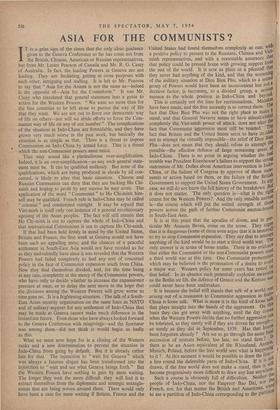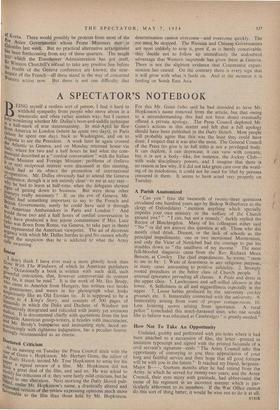ASIA FOR THE COMMUNISTS ?
IT is a grim sign of the times that the only clear guidance given to the Geneva Conference so far has come not from the British, Chinese, American or Russian representatives, but from Mr. Lester Pearson of Canada and Mr. R. G. Casey of Australia. In fact, the leading Powers at Geneva are not leading. They are hesitating, getting at cross .purposes with each other, intriguing and stalling. It is left to Mr. Pearson to say that " Asia for. the Asians is not the same as—indeed is the opposite of—Asia for the Cominform." It was Mr. Casey who translated that general statement into a guide to action for the Western Powers. " We want no more than for the free countries to be left alone to pursue the way of life that they want. We are not out to force our democratic way of life on others—nor will we abide efforts to force the Com- munist way of life on any of our number." The complications of the situation in Indo-China are formidable, and they have grown very much worse in the past week, but basically the situation is as simple as that. There is a threat to impose Communism on Indo-China by armed force. That is a threat which the non-Communist powers must resist.
That may sound like a platitudinous over-simplification. Indeed, it Is an over-simplification—as any such general state- ment must be. It can be qualified endlessly. But none of the qualifications, which are being produced in shoals by all con- . cerned, is likely to alter that basic situation. Chinese and Russian Communists can deny that they are backing Ho Chi- minh and hoping to profit by any success he may score. The application of the word " Communist " to Ho Chi-minh him- self may be qualified. French rule in Indo-China may be called " colonial " and condemned outright. It may be argued that Viet-minh is itself only one instance of a general revolutionary uprising of the Asian peoples. The fact will still remain that Ho Chi-minh is out to capture the whole of Indo-China and that international Communism is out to capture Ho Chi-minh.
If that had been held firmly in mind by the United States. Britain and France, the first week at Geneva would not have been such an appalling mess; and the chances of a peaceful settlement in South-East Asia would not have receded as far as they undoubtedly have since it was revealed that the Western Powers had failed completely to find any sort of, concerted policy in the face of Communist expansion south from China. Now they find themselves divided, and, for the time being at any rate, completely at the mercy of the Communist powers, who have only to decide whether to increase the expansionist pressure at once, or to delay the next move in the hope that the divisions among the Western Powers will grow worse as time goes on. It is a frightening situation. The talk of a South- East Asian security organisation on the same lines as NATO and of military support for any settlement of Indo-China that may be made at Geneva cannot make much difference in the immediate future. Even those who have always looked forward to the Geneva Conference with misgivings—and the Spectator was among them—did not think it would begin as badly as this. United States. had found themselves completely at one, with a positive policy to present to the Russians, Chinese and Vic': minh representatives, and with a reasonable assurance that that policy could be pressed home with growing support fro°, the rest of the world. It is now as plain as a pikestaff Ilia' they never had anything of the kind, and that the worsenitif of the military situation at Dien Bien Phu, which to a united group of Powers would have been an inconvenient but not I decisive factor, is becoming, to a divided group, a serioul menace to the whole position in Indo-China and beyond. This is certainly not the time for recriminations. Mistake$ have been made, and the first necessity is to correct them. The fact that Dien Bien Phu was not the right place to make $, stand, and that General Navarre seems to have miscalculated completely the. Viet-minh power of attack, .does not alter the fact that Communist aggression must still be resisted. The, fact that Britain and the United States seem to have de=idc' not to attempt the virtually impossible—the relief of Dien Bien Phu—does not mean that they should refuse to attempt the possible—the effective defence of large remaining areas 0, Indo-China. There is no point in arguing whether the real trouble was President Eisenhower's failure to support the strong statements of Mr. Dulles about American intervention in Inds China, or the failure of Congress to approve of those stay,' ments or action based on them, or the failure of the British Government to support the United States Governinent. In anY, case, we still do not know the full history of the breakdown. But it does not matter. The only question is—what is the right course for the Western Powers? And the only sensible answer is—the course which will put the united strength of 0°51 powers across the path of further Communist encroachinen in South-East Asia.
It is at this point that the apostles of doom, and in Of' ticular Mr. Aneurin Bevan, come on the scene. They argil°, that it is dangerous (some of them even argue that it is immoral/ to try to stop Communist expansion. They say that to attempt anything of the kind would be to start a third world war. The only answer is in terms of home truths. There is no evidence that either the Communist or the non-Communist powers want a third world war at this time. One Communist protestatio!n which may be believed is the protestation of a desire to avoid a major war. Western policy for some years has rested 011 that belief. In its absence such potentially explosive measura as the Berlin air lift, the defence of Greece and the Korean wet could never have been undertaken. It is because the belief still stands that talk of a world vier arising out of a resistance to Communist aggression in Ind?: China is loose talk. What is more it is the kind of loose tx, that plays straight into the hands of the aggressors. On till9 basis they can get away with anything, until the day conic' when the Western Powers decide that no further aggression can be tolerated, as they surely will if they are driven far enough-- as surely as they did in September, 1939. Has that lesson been forgotten already ? Are we to go through the same fatal succession of retreats before, too late, we stand firm ? (2,f Korea. There would possibly be protests from most of the we Asian Governments whose Prime Ministers metiin ',Womb() last week. But no practical alternative arrangement has been forthcoming from any of these quarters. The tangle Into which the Eisenhower Administration has got itself. Sir Winston Churchill's refusal to take any positive line before the results of the Geneva conference are known., the near- 1,e,sPair of the French—all these stand in the way of concerted Yvestern action now. But there is not one difficulty that determination cannot overcome—and overcome quickly. The rot must be stopped. The Russian and Chinese.Governments are most unlikely to stop it, even if, as is barely conceivable, they "decide not to follow up immediately the undoubted advantage that Western ineptitude has given them at Geneva. There is not the slightest evidence that Communist expan- sionism has ceased. On the contrary there is every sign that it will grow with what it feeds on. And at the moment it is feeding on South East Asia.











































 Previous page
Previous page